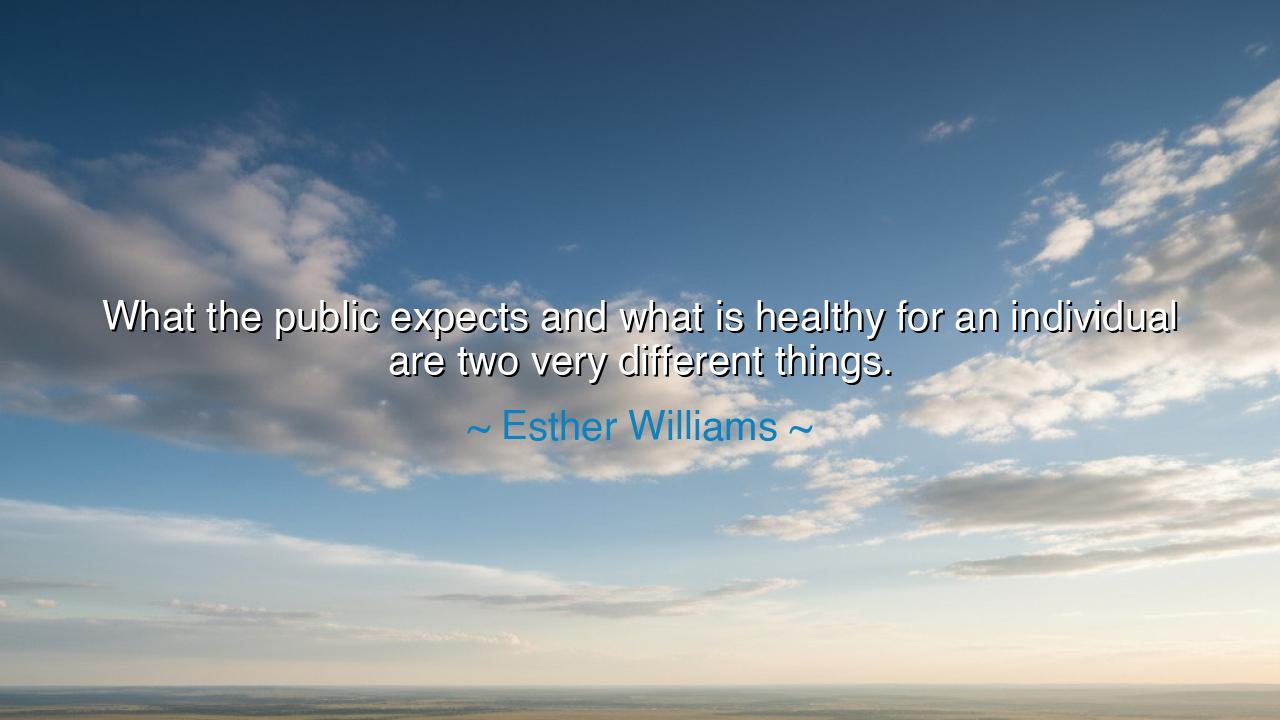
What the public expects and what is healthy for an individual are
What the public expects and what is healthy for an individual are two very different things.






In the wise and haunting words of Esther Williams, the radiant star who once ruled both the waters and the silver screen, there shines a truth that endures across ages: “What the public expects and what is healthy for an individual are two very different things.” These words were not spoken lightly. They came from a woman who had lived beneath the blinding lights of fame — who had seen how the adoration of the crowd, though glittering like gold, can corrode the soul when mistaken for purpose. Her wisdom reminds us that expectation and well-being are often in conflict, that the applause of the world can drown out the quiet voice of one’s own spirit.
To understand her meaning, we must first grasp the chasm that lies between public expectation and personal truth. The public — be it the crowd, society, or even family — is a creature of endless hunger. It desires perfection, performance, and permanence. It cheers the hero when he rises, but forgets him when he falls. The individual, by contrast, is fragile, living, breathing — not a symbol, but a soul. To live only to satisfy the public’s gaze is to feed a fire that will never warm you. Williams knew this, for she had been made an idol of beauty and grace, yet within her heart, she carried the quiet ache of a woman longing for rest, for balance, for health — both of body and of spirit.
The ancients, too, knew this conflict well. Marcus Aurelius, emperor and philosopher, ruled the vast Roman world, yet in his private writings he confessed the emptiness of power and praise. He warned himself, “The opinion of others is smoke and wind.” For even as he was revered as divine, he knew that the health of the soul lay not in pleasing the multitude but in walking the path of virtue and peace. Like Williams, he understood that public expectation can be a gilded prison — one that traps the heart behind the bars of reputation and duty.
Esther Williams, celebrated for her shimmering performances in the golden age of Hollywood, lived under this burden. The public saw her as a symbol of perfection — the eternal mermaid, forever youthful, radiant, strong. Yet behind the scenes, she faced injuries, exhaustion, and loneliness. The world demanded she always smile, always sparkle, always swim — but the body grows weary, and the spirit craves authenticity. Her words arose from that struggle: the realization that to be endlessly perfect for others is to neglect the sacred work of being whole for oneself. Health, she discovered, is not found in applause, but in truth — the courage to say “enough,” to listen inwardly, and to choose peace over performance.
History has repeated her lesson in countless forms. The great athletes, leaders, and artists of every era have faced the same storm. The warrior who fights every battle to please his people eventually breaks his sword; the artist who paints for approval loses the joy of creation. Even the saints, those who sought only to serve, learned that self-care is not selfishness but sustenance — for one cannot pour from an empty vessel. So too did Williams remind us that to pursue what the world wants at the cost of our own well-being is to trade life for illusion.
Her wisdom, though born from the glamour of cinema, applies to all who live under the eyes of others. The worker who sacrifices rest for recognition, the parent who hides pain for pride, the youth who shapes their soul to fit the fashions of the age — all walk this same path of quiet exhaustion. But the ancient law still stands: no external validation can heal an internal wound. To honor your health — physical, mental, emotional — is to honor the sacred duty of being alive. The body is the temple, the mind the flame; both must be tended with care, not consumed in the service of vanity or expectation.
Thus, let the lesson of Esther Williams be carved into your heart: seek not to please the crowd, but to preserve the self. Applause fades, fame dies, but health endures as the root of all joy. Learn to rest when weary, to speak truth when silence would suffocate, and to choose the nourishment of authenticity over the starvation of pretense. Remember, the world may adore your mask, but only you can love your soul.
So, my child, when the world shouts for you to perform, pause and listen to the whisper within. The public will always demand — but your spirit asks only to be whole. Heed Esther Williams’ timeless truth: “What the public expects and what is healthy for an individual are two very different things.” Live not for the gaze of others, but for the harmony of your being. For in choosing yourself, you do not forsake the world — you show it what it truly means to be alive.






AAdministratorAdministrator
Welcome, honored guests. Please leave a comment, we will respond soon